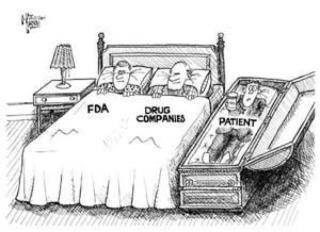The Union of Concerned Scientists surveyed 5,918 scientists at the FDA to examine the state of science there. The survey featured one essay question that allowed the scientists to provide a written narrative. Of the 997 FDA scientists that responded to the essay question, 20% stated that they had been asked, “…for nonscientific reasons, to inappropriately exclude or alter technical information or their conclusions in an FDA scientific document.” More than 40% feared retaliation if they expressed their safety concerns in public.
There was a great deal of concern about political appointees influencing FDA actions; 61% of the scientists knew of instances when an FDA or HHS political appointee had inappropriately entered into FDA determinations or actions. Commercial interests also influence the FDA’s actions, 60% of the respondents knew of cases where “commercial interests have inappropriately induced or attempted to induce the reversal, withdrawal, or modification of FDA determinations or actions.”
The abuses of science at the FDA have very real consequences. A few instances of this abuse are posted on the website for the Union of Concerned  Scientists. In February 2004, the FDA prevented Dr. Andrew Mosholder, one of its top experts from testifying at a public hearing addressing the potential risk of increased suicide rates in children taking antidepressants. The FDA forced Dr. Mosholder to remove information about the risks of antidepressants from records he was submitting to Congress—and to conceal the deletions, according to the House Energy and Commerce Subcommittee on Oversight and Investigations.
Scientists. In February 2004, the FDA prevented Dr. Andrew Mosholder, one of its top experts from testifying at a public hearing addressing the potential risk of increased suicide rates in children taking antidepressants. The FDA forced Dr. Mosholder to remove information about the risks of antidepressants from records he was submitting to Congress—and to conceal the deletions, according to the House Energy and Commerce Subcommittee on Oversight and Investigations.
In April 2001 an FDA panel recommended to approve the antibiotic Ketek. The study of the drug was later found to be fraudulent. Doctors were receiving $400 for each patient that they enrolled into the study. Signatures and patient information were forged; 90% of the subjects at one location did not receive the drug. Even after the Annals of Internal Medicine wrote about serious liver problems caused by the drug, the FDA continued to cite the study. The FDA stated that “based on the pre-marketing clinical data it appeared that the risk of liver injury with Ketek was similar to that of other marketed antibiotics.”
The Office of Drug Safety (ODS) found 110 cases of liver problems between the release of the drug in 2004 and 2006—including liver failure and four deaths. ODS found that Ketek caused liver failure four times more frequently than other antibiotics and recommended that the FDA withdraw the drug from the market. In spite of these problems, the FDA allowed pediatric trials of Ketek to take place. The drug was given to children as young as six months old. The FDA ignored congressional requests for files, a briefing, and interviews with agents investigating this matter.
Dr. David Graham, associate science director of the Office of Drug Safety at the FDA alleges that FDA officials tried to suppress and delay the results of his work that came to the conclusion that Vioxx increased the risk of heart attack and stroke. According to Dr. Graham, the FDA was “virtually incapable of protecting America”. He also states that, “…the review and clearance process had been turned into a battleground, full of contention and intimidation because our managers, the people who fill out our performance evaluations, had created a system where it was taking a great risk to stand firm in our scientific beliefs.” His study indicates that between 88,000 and 139,000 people have had heart attacks or strokes and about 55,000 people have died because of Vioxx.
The FDA has a history of distorting scientific information, intimidation of employees and covering up its activities. How are we able to rely on any information that comes from an agency this corrupt?
Information obtained from www.ucsusa.org






